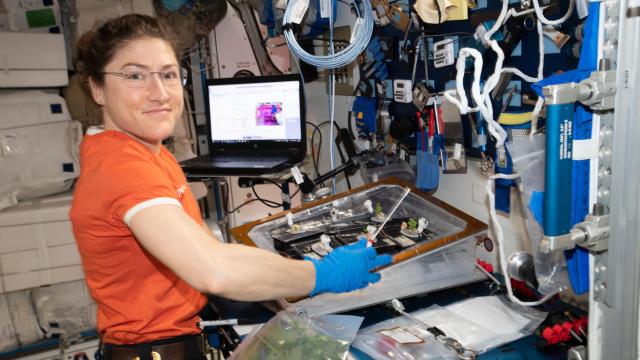Christina Koch has spent the past month orbiting Earth aboard the International Station. Earlier today, the NASA astronaut learned she won’t be coming home for another 10 months. Her prolonged stay — at an estimated 328 days — will establish a new record for the longest spaceflight completed by a woman.
NASA’s new crew assignments were announced earlier today, at which time Koch (pronounced “Cook”) learned that she’ll be participating in ISS missions 59, 60, and 61. Koch arrived at the ISS on March 14 and, if all proceeds as planned, won’t return to Earth until February 2020.
“It feels awesome,” said Koch in a video released by NASA. “I have known that this was a possibility for a long time, and it’s truly a dream come true to know that I can continue to work on the program that I have valued so highly my whole life. To be able to contribute to that and give my best every day to that for as long as possible is a true honour and a dream come true,” she said.
NASA also announced an extended stay for astronaut Andrew Morgan, who will join the ISS later this summer, and the first space flight for Jessica Meir, which is scheduled for September.
At an estimated 328 days in space, Koch will set a new record for the longest spaceflight completed by a woman. She will break the current record held by NASA astronaut Peggy Whitson, who spent 288 days in space from 2016 to 2017. Koch will come close to the overall NASA record currently held by Scott Kelly, who spent 340 days in space from 2015 to 2016. The all-time record belongs to Russian cosmonaut Valeri Polyakov; he spent 437 days aboard the Mir space station from 1994 to 1995.
The purpose of prolonged stays is to gather important data about the effects of working in space, such as the influence of microgravity, radiation, confinement, and excess carbon dioxide on human health. As NASA gathers more data, the space agency will increasingly be able to detect variability among individuals, and important differences between men and women. Insights from these missions will inform our strategies for reaching Mars and beyond.
“Astronauts demonstrate amazing resilience and adaptability in response to long duration spaceflight exposure,” Jennifer Fogarty, chief scientist of the Human Research Program at NASA’s Johnson Space Center in Houston, said in a statement. “This will enable successful exploration missions with healthy, performance-ready astronauts. NASA is looking to build on what we have learned with additional astronauts in space for more than 250 days. Christina’s extended mission will provide additional data for NASA’s Human Research Program and continue to support future missions to the Moon and Mars.”
Not home until February 2020—NASA astronauts are tough, no question.
[NASA]
